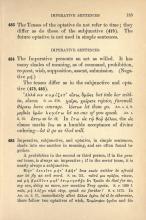484. The Imperative presents an act as willed. It has many shades of meaning, as of command, prohibition, request, wish, supposition, assent, submission. (Negative μή.)
The tenses differ as in the subjunctive and optative (§§ 475, 483).
Ἀλλά νιν κομίζετʼ εἴσω, δμῶες.
But take her within, slaves.
Soph. Antigone 577–578
χαῖρε, χαίρετε.
Rejoice, farewell.
θάρσει.
Have courage.
ἰόντων.
Let them go.
Xen. Anabasis 1.4.8
μηδεὶς ῡ̔μῶν λεγέτω.
Let no one of you speak.
Xen. Anabasis 1.3.15
ἔστω.
So be it.
In ἴτω ὡς τῷ θεῷ φίλον, the ὡς clause marks ἴτω as a humble acceptance of divine ordering— Let it go as God will.
485. Imperative, subjunctive, and optative, in simple sentences, shade into one another in meaning, and are often found together. A prohibition in the second or third person, if in the present tense, is always an imperative; if in the aorist tense, it is nearly always a subjunctive.
Μήτʼ ὀκνεῖτε μήτʼ ἀφῆτʼ ἔπος κακόν.
Neither be afraid nor let fly an evil word.
Soph. Oedipus at Colonus 731
ταῦτά μοι πρᾶξον, τέκνον, καὶ μὴ βράδῡνε μηδʼ ἐπιμνησθῇς ἔτι Tροίᾱς.
Do that for me, my son, delay no more, nor mention Troy again.
Soph. Philoctetes 1399–1401
παῦε, μὴ λέξῃς πέρᾱ.
Stop, speak no farther!
Soph. Philoctetes 1276
In Xen. Anabasis 3.2.37, immediately after ἄλλως ἐχέτω (let it be otherwise), there follow two optatives of wish, Χειρίσοφος ἡγοῖτο and δύο στρατηγὼ ἐπιμελοίσθην, which are equally imperative in force, but perhaps more courteous in form.


